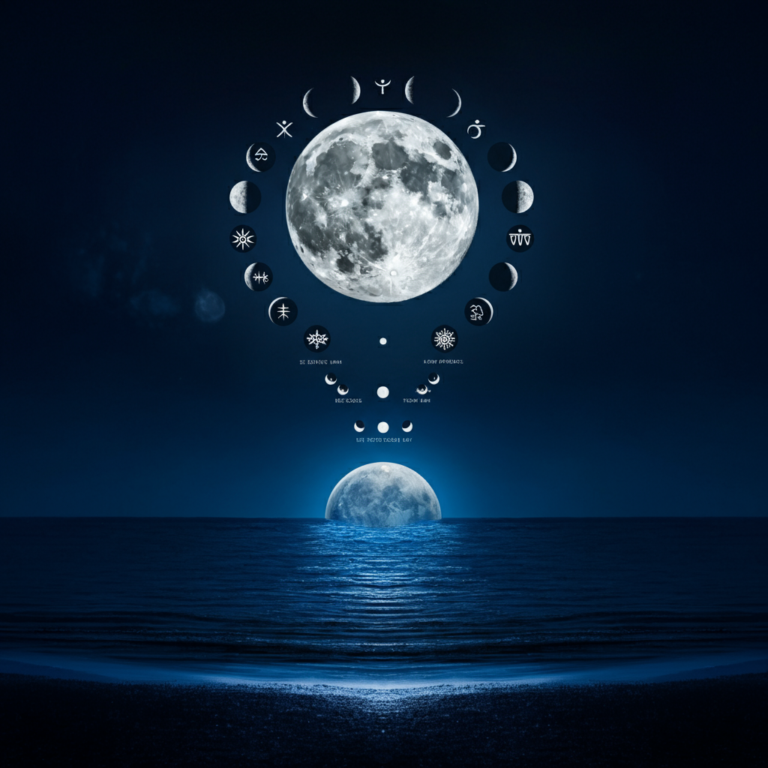Have you ever stood under a full Moon, gazed up, and felt that sense of connection? Like it’s more than just a distant rock in the sky? Turns out, you’re not imagining things. The Moon isn’t just a pretty backdrop for werewolf stories and romantic dates—it’s intricately tied to life here on Earth, shaping everything from tides to cultural beliefs to life’s very stability.
It’s wild to realize that without the Moon, Earth as we know it wouldn’t exist. And yet, a lot of us don’t give it the credit it’s due. But don’t worry—this post is here to give the Moon its moment in the spotlight. Whether you’re a fan of science, or astrology, or just looking for fascinating facts to drop at your next dinner party, this is for you.
Here’s everything you need to know about the Moon’s influence on Earth and why we literally can’t live without it.
Table of Contents
The Moon’s Significance in Human History
The Moon has been there, steady and constant, for as long as humans have stared at the skies. It’s a 4.5-billion-year-old rock, formed not long after Earth itself. A Mars-sized body collided with our planet, sending debris into space which eventually coalesced into what we now call the Moon. Fun fact, right?
It’s more than just a satellite. The Moon has always been an anchor for humanity—inspiring art, calendars, navigation, and even our first steps into space. Ancient civilizations worshipped it; explorers used it to guide their ships; and poets still write about its glow. Across continents and centuries, the Moon has remained a silent companion to us all.
But its contributions go far beyond emotional poetry and dreamy Instagram captions.
How the Moon Controls Earth’s Tides
If you’ve been to the beach, you’ve seen the Moon’s influence on tides without realizing it. Here’s the quick science, simplified to save you headaches—the Moon’s gravitational pull creates a bulge in Earth’s oceans, leading to high tides on the side of the planet facing the Moon. On the opposite side, there’s another high tide created by the centrifugal force of Earth’s rotation.
Got that? If not, just think of it like this—the Moon tugs at our oceans, making them swell and recede. This constant push and pull shapes marine ecosystems impacts weather patterns and even affects human activities like fishing and shipping.
Without the Moon, tides would still exist but they’d be much weaker, controlled only by the Sun. Life near the coasts wouldn’t look anything like it does now.
Cultural Impact of Lunar Cycles
Now, onto something a little more spiritual. Every culture on Earth has, at some point, told stories about the Moon. Think about it—what would astrology be without lunar phases?
From full Moon rituals in Indigenous traditions to the way Ramadan begins with the sighting of the crescent Moon, people everywhere have been structuring time, beliefs, and life around that glowing orb. Even the term “lunatic” comes from the belief that the full Moon could make people, well, a little unhinged.
And let’s not forget farmers who relied (and some still do) on the lunar calendar to decide the best time to plant and harvest crops. That’s some real-life Moon magic, right there.
Meanwhile, astrology fans would argue that the Moon controls emotions and intuition, making its pull deeply personal. Whether or not you buy into zodiac charts, you’ve got to admit there’s something powerful about how the Moon’s cycles are mirrored in human creativity, seasons, and moods.
Stabilizing Earth’s Axis and Climate
Here’s a curveball—did you know the Moon is the unsung hero preventing Earth from tipping over like a clumsy toddler? Earth tilts on its axis by about 23.5 degrees, and the gravitational tug-of-war with the Moon helps stabilize that tilt. Why does this matter? Because the tilt determines our seasons.
Without the Moon’s presence, Earth’s tilt would wobble wildly. Summers could become scorching hot, winters unbearably cold, and entire regions uninhabitable. Imagine trying to figure out what to wear! (Although, existential climate chaos is probably the bigger concern.)
This stability also helps maintain more predictable weather patterns, allowing ecosystems to thrive relatively undisturbed. Long story short—the Moon isn’t just pulling the ocean; it’s also keeping our planet in check.
Lunar Exploration and What Comes Next
We can’t talk Moon without mentioning the Apollo missions, right? Landing on the Moon in 1969 wasn’t just about American pride—it was about pushing the limits of human potential. Since then, we’ve sent more missions, including Apollo 17 in 1972 (the last crewed mission) and uncrewed missions like China’s Chang’e program.
But it’s not just about flags and footprints—we’ve also discovered important stuff like the presence of water ice in craters. The Moon could hold the key to deep space exploration. For one, it might become a refuelling station for trips to Mars or beyond. Plus, studying lunar soil helps us understand Earth’s history and how life arose here.
And yes, commercial trips to the Moon might soon become a reality. Companies like SpaceX are already working on making that sci-fi dream an accessible experience. Who’s ready for Moon tourism?
Reflecting on the Moon’s Legacy
Here’s the thing—the Moon isn’t just a side character in Earth’s story. It’s a full-on MVP. From controlling the tide pools that may have incubated early life, to inspiring the myths and calendars that shaped ancient civilizations, to keeping our planet habitable today—the Moon does it all, silently and steadily.
Think about that next time you step outside at night. The Moon likely influenced where humans settled, helped us develop advanced navigation, and played an unsung role in the technology we use today.
If you’ve never considered the Moon beyond its beauty, now’s the time. Ask questions, dig deeper, and keep exploring. Because life, as we know it, is tied to that glowing rock in ways most of us are just beginning to understand.
Join the Conversation
What’s your favourite thing about the Moon? Share it in the comments, tag a friend who’d love this post, and start your Moon-gazing session. Oh, and if you’re feeling extra inspired, check out some local lunar events or read up on lunar science. The more we learn about the Moon, the more extraordinary life on Earth seems.





















0 Comments